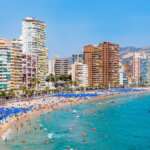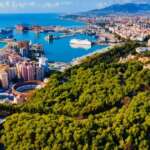A Closer Look at Spain
Spain Flag

Spain Formation Date
December 6, 1978
Spain Capital Name
Madrid
Spain Neighbours
Exploring Spain
Spain: A Rich and Vibrant Country with a Fascinating History
Located in southwestern Europe, Spain is a country that is steeped in history and culture. With its diverse landscapes, rich traditions, and vibrant cities, Spain has captured the hearts of travelers from all over the world. In this article, we will delve into the various aspects of Spain, from its geography and history to its government and economy, giving you a comprehensive understanding of this fascinating country.
Key Takeaways
- Spain is located in southwestern Europe and is known for its diverse landscapes, rich culture, and vibrant cities.
- The country's name comes from the Roman word "Hispania," which means "land of rabbits."
- Spain has a constitutional monarchy with a parliamentary system of government.
- The country's economy is driven by various sectors, including tourism, agriculture, and manufacturing.
- Spanish is the official language of Spain, and Roman Catholicism is the dominant religion.
Geography
Spain is the fourth largest country in Europe, covering an area of 505,990 square kilometers. It shares borders with Portugal to the west and France to the north. The country is also surrounded by the Mediterranean Sea to the south and east, giving it a long coastline of over 4,900 kilometers.
The landscape of Spain is incredibly diverse, with mountains, plains, valleys, and coastal regions. The Pyrenees Mountains form a natural border between Spain and France in the north, while the Sierra Nevada range dominates the southern region. The country also has several rivers, including the Tagus, Ebro, and Guadalquivir.
Spain is rich in natural resources, including iron ore, coal, and copper. The country also has a significant agricultural sector, producing fruits, vegetables, and olives. The Mediterranean climate in the southern regions allows for the cultivation of citrus fruits and grapes, which are used to produce Spain's famous wines.
Origin and History
The history of Spain can be traced back to ancient civilizations, including the Phoenicians, Greeks, and Romans. The country was known as "Hispania" during the Roman Empire and was a crucial part of the empire's territory. In the 8th century, the Moors invaded Spain and established Muslim rule, leaving a lasting impact on the country's culture and architecture.
In 1492, Spain experienced a significant change when Christopher Columbus discovered the New World, leading to an era of exploration and colonization. The Spanish Empire became one of the most powerful in the world, with territories in South America, Central America, and parts of Asia.
In the 20th century, Spain went through a turbulent period with the Spanish Civil War (1936-1939) and the dictatorship of General Francisco Franco (1939-1975). However, after Franco's death, Spain transitioned into a constitutional monarchy with a parliamentary system of government.
Government and Politics
Spain is a constitutional monarchy with King Felipe VI as the head of state. However, the monarch's role is mainly symbolic, and the country is governed by a prime minister and a parliament. The parliament is made up of two chambers - the Congress of Deputies and the Senate - which are responsible for passing laws and overseeing government activities.
Spain is divided into 17 autonomous communities and two autonomous cities, each with its own government. These communities have varying levels of autonomy and are responsible for managing their own affairs.
Spain has strong diplomatic ties with other countries, and it is a member of the European Union, the United Nations, and the World Trade Organization. The country also maintains close relationships with its neighboring countries, including Portugal, France, and Morocco.
Commerce and Economy
The Spanish economy is the fifth-largest in Europe and is driven by various sectors, including tourism, agriculture, manufacturing, and services. The country is known for its production of olive oil, wine, and fruits such as oranges and lemons. It is also a leading producer of cars, machinery, and pharmaceuticals.
Tourism plays a significant role in Spain's economy, with millions of visitors flocking to the country each year to experience its rich culture and beautiful landscapes. The tourism industry generates billions of dollars in revenue and provides employment opportunities for many Spaniards.
The currency used in Spain is the Euro, and the country has strong trade relations with other European countries as well as the United States and China.
Demographics
Spain has a population of over 47 million people, with a relatively even distribution between urban and rural areas. The majority of the population is concentrated in cities such as Madrid, Barcelona, and Valencia.
The Spanish people are a diverse mix of ethnicities, with influences from various civilizations throughout history. However, the majority of the population identifies as White or European. The country also has a significant immigrant population from Latin America and North Africa.
The average age in Spain is 43 years old, with a life expectancy of 83 years. The country also has a high literacy rate of over 98%, thanks to its well-developed education system.
Culture
Spanish culture is a blend of various influences, including Roman, Moorish, and Christian traditions. The country is known for its vibrant art scene, with famous artists such as Pablo Picasso and Salvador Dali hailing from Spain. Music is also an essential part of Spanish culture, with flamenco and classical guitar being popular genres.
The country is also known for its lively festivals and celebrations, such as the Running of the Bulls in Pamplona and the La Tomatina festival in Buñol. Traditional holidays such as Semana Santa (Holy Week) and Christmas are also celebrated with great enthusiasm.
Languages and Religion
The official language of Spain is Spanish, also known as Castilian. However, there are several regional languages spoken throughout the country, including Catalan, Basque, and Galician. These languages have a strong cultural significance and are protected by law.
The majority of Spaniards identify as Roman Catholic, although there is a growing number of non-religious people in the country. Other religions practiced in Spain include Islam, Judaism, and Protestantism.
Education and Healthcare Systems
Spain has a well-developed education system that provides free education for all children between the ages of 6 and 16. The country also has several prestigious universities, including the University of Salamanca, which was founded in 1218.
The healthcare system in Spain is also highly regarded, with universal coverage for all citizens and residents. The country has a high life expectancy and low infant mortality rate compared to other developed countries.
Sports and Recreation
Sports play a significant role in Spanish culture, with football (soccer) being the most popular sport in the country. Spain has produced many world-renowned football players and has won several international championships, including the FIFA World Cup and the UEFA European Championship.
Other popular sports in Spain include basketball, tennis, and cycling. The country also has a rich tradition of bullfighting, although it has become a controversial topic in recent years.
Tourism
Spain is a top tourist destination, attracting millions of visitors each year. The country's diverse landscapes, rich culture, and vibrant cities make it an ideal place to visit. Some of the most popular tourist attractions in Spain include the Sagrada Familia in Barcelona, the Alhambra in Granada, and the Prado Museum in Madrid.
There are also many outdoor activities to enjoy in Spain, such as hiking in the Pyrenees Mountains, surfing on the beaches of the Canary Islands, or skiing in the Sierra Nevada. The country also has a well-developed transportation system, making it easy for tourists to travel between cities and regions.
Travel Information for Foreign Visitors
If you are planning to visit Spain, there are a few things you should know before your trip. First, most foreign visitors will need a valid passport and a visa to enter the country. However, citizens of certain countries may be exempt from this requirement.
It is also essential to familiarize yourself with local customs and etiquette. For example, it is customary to greet people with a kiss on both cheeks when meeting them for the first time. Tipping is not mandatory but is appreciated for good service.
The currency used in Spain is the Euro, and credit cards are widely accepted. However, it is always a good idea to have some cash on hand for smaller purchases or when traveling to more rural areas.
When it comes to safety, Spain is generally considered a safe country for tourists. However, it is always a good idea to take precautions, such as keeping your valuables secure and being aware of your surroundings.
Quotes
"To travel is to discover that everyone is wrong about other countries." - Aldous Huxley
"Spain is a fascinating mix of people, languages, culture, and food, but if there is one thing all Spaniards share, it's a love for life." - José Andrés
"The Spanish people are very open, welcoming, and friendly. They have a zest for life that I find contagious." - Gwyneth Paltrow
Conclusion
In conclusion, Spain is a country with a rich history, diverse culture, and thriving economy. From its stunning landscapes to its vibrant cities, there is something for everyone in this beautiful country. Whether you are interested in history, art, or simply want to relax on the beach, Spain has it all. As the country continues to develop and grow, it will undoubtedly remain a top destination for travelers from all over the world.
Spain Highest Point Name
The highest point in Spain is Pico de Teide, located on the island of Tenerife in the Canary Islands. The peak has an elevation of 3,718 metres (12,198 feet) above sea level, making it the highest point in both Spain and the whole of the Iberian Peninsula.
Spain Capital Longitude
The capital of Spain is Madrid, with a longitude of 3.7038° E.
Spain Capital Latitude
Madrid, Spain is the capital and its latitude is 40.4165° N.
Spain Official Languages
Spanish is the official language of Spain, with co-official status in some regions. Regional languages such as Basque, Catalan, Galician, and Occitan are also spoken in the country.
Spain Ethnic Groups
The ethnic makeup of Spain is primarily composed of a wide variety of Indigenous Iberian, Latin American, Roma Gypsy, North African, and Eastern Europeans as well as a few other small minority groups. According to the last census of 2018, the distribution of the population by declared nationalities was 87.1% Spanish, 8.6% other European, 3% Latin American, 1.2% African, and 0.1% Asian. Spain is known to be one of the most diverse countries to exist in Europe and has a long history with waves of immigration from diverse cultures. Iberians are believed to be the oldest inhabitants in Spain, dating back to the Neolithic Age. Subsequent waves of immigration have come from the Basque Country, Galicia, Andalusia, Asturias, and other regions from other parts of Europe like Italy, France, Germany, and Poland. Other ethnic groups include the Roma Gypsy, Sephardic Jews, Moroccans, Algerians, Ecuadorians, Colombians, Venezuelans, Argentineans, and Cubans.
Spain Religions
The predominant religion in Spain is Christianity, specifically Roman Catholicism. According to a 2014 survey, 77.6% of Spaniards identified themselves as Catholic. Other religious faiths present in Spain include Islam (2.9%), other Christian religions (1.3%), Buddhist (0.2%), and Jewish (0.1%). Additionally, 1.5% of Spanish residents identified as atheists or agnostics. The majority of Spain's Muslim population lives in the autonomous region of Catalonia and is mainly of Moroccan and Pakistani descent. Though Spain is officially a Catholic country, it has grown to become much more diverse in recent decades as the influx of migrants has brought with it a variety of languages and cultures.
Spain Total Area
Spain has a total land area of 505,990 km².
Spain Land Area
Spain is the world's 52nd largest country by land area, with a total area of 505,990 km2 (195,360 mi2). It is the 4th largest country in the European Union, after France, Spain, and Sweden, and the 27th largest in the world.
Spain Water Area
Spain has the twelfth largest water area in the world, with an estimated total area of 2,308,000 square kilometers (895,146 square miles).
Spain Total Population
The total population of Spain in 2020 is estimated to be around 46.657 million.
Spain Currency Name
The official currency of Spain is the Euro (EUR).
Spain Currency Code
The country currency code for Spain is EUR.
Spain Currency Symbol
The country currency symbol of Spain is € (Euro).
Spain Time Zones
- Standard Time: UTC+01:00
- Daylight Saving Time: UTC+02:00
Spain has two standard time zones and one daylight saving time zone, all of which are defined in reference to Coordinated Universal Time (UTC). The two standard time zones are UTC+1, known as Central European Time, and UTC+2, known as Eastern European Time. From late March to late October (the period of daylight saving time), Spain shifts forward by one hour and operates under UTC+2, making a total of three time zones. This period is known as Central European Summer Time (CEST). On the last Sunday of March, clocks typically move forward at 1:00 am to 2:00 am, and on the last Sunday of October, clocks move back at 2:00 am to 1:00 am.
Spain Calling Code
– 34
Spain Internet TLD
www.aveholidays.es
How to Say "Spain" In Different Languages?
- German
- Spanien (de-AT)
- Portuguese
- Espanha (pt-BR)
- French
- Espagne (fr-FR)
- German
- Spanien (de-DE)
- Greek
- Ισπανία (el-GR)
- Hindi
- स्पेन (hi-IN)
- Indonesian
- Spanyol (id-ID)
- Italian
- Spagna (it-IT)
- Japanese
- スペイン (ja-JP)
- Spanish
- España (es-ES)
- Dutch
- Spanje (nl-NL)
- Polish
- Hiszpania (pl-PL)
- Portuguese
- Espanha (pt-PT)
- Russian
- Испания (ru-RU)
- Thai
- สเปน (th-TH)
- Turkish
- İspanya (tr-TR)
- Arabic
- إسبانيا (ar-AE)
- Ukrainian
- Іспанія (uk-UA)
- Vietnamese
- Tây Ban Nha (vi-VN)
Spain Popular Holidays
- New Year's Day
- 1 January
- Epiphany
- 6 January
- Reyes Magos
- 6 January
- Constitution Day
- 12 February
- Valentine's Day
- 14 February
- National Day of Andalusia
- 28 February
- Carnival
- 28 February (4 March)
- Día Internacional de la Mujer
- 8 March
- Autonomous Region Holidays
- 9 March
- Fallas
- 15 March (19 March)
- St. Joseph's Day
- 19 March
- Holy Thursday
- 1 April
- Good Friday
- 2 April
- Easter Sunday
- 4 April
- Autonomous Cities Holidays
- 7 April
- Maundy Thursday
- 13 April
- Bank Holiday
- 17 April
- St. George's Day
- 23 April
- Regional Holiday
- 24 April
- Fiesta del trabajo
- 1 May (3 May)
- Bank Holiday
- 1 May
- International Workers' Day
- 1 May
- Day of the Cross
- 3 May
- Mother's Day
- 9 May
- Pentecost
- 23 May
- Day of the Autonomous Community, Asturias
- 28 May
- Day of Castile
- 28 May
- National Day of the Canary Islands
- 30 May
- Corpus Christi
- 31 May
- Bank Holiday
- 1 June
- Navarre Holiday
- 11 June
- Throne Day
- 12 June
- Father's Day
- 20 June
- National Day of Aragon
- 23 June
- Fiesta de San Juan
- 23 June
- St. Peter and Paul Day
- 29 June
- Our Lady of Mount Carmel Day
- 16 July
- Feria del Carmen
- 16 July (18 July)
- Santiago Apostle
- 25 July
- St. James Day
- 25 July
- Regional Holiday
- 1 August
- St. Lawrence's Day
- 9 August
- Assumption Day
- 15 August
- Bank Holiday
- 15 August
- Día de las Peñas
- 15 August
- Assumption of Mary
- 15 August
- National Day of Galicia
- 15 August
- National Day of the Balearic Islands
- 6 September
- Latin American Independence Day
- 8 September
- National Day of Catalonia
- 11 September
- St. Matthew's Day
- 21 September
- St. Michael's Day
- 29 September
- Festival of Tastes
- 4 October
- National Day of Valencia
- 9 October
- Regional Holiday
- 10 October
- Bank Holiday
- 12 October
- National Day of Spain
- 12 October
- Olive Day of Peace
- 30 October
- All Saints' Day
- 1 November
- Virgin of Almudena
- 9 November
- Universal Children's Day
- 20 November
- St. Andrew's Day
- 30 November
- Day of the Constitution
- 6 December
- Immaculate Conception
- 8 December
- World Human Rights Day
- 10 December
- Regional Holiday
- 20 December
- Christmas
- 25 December
- St. Stephen's Day
- 26 December





















